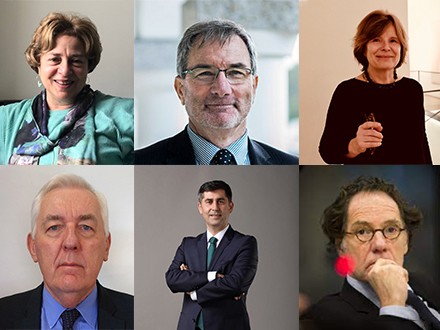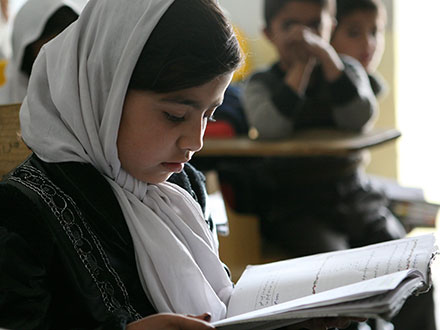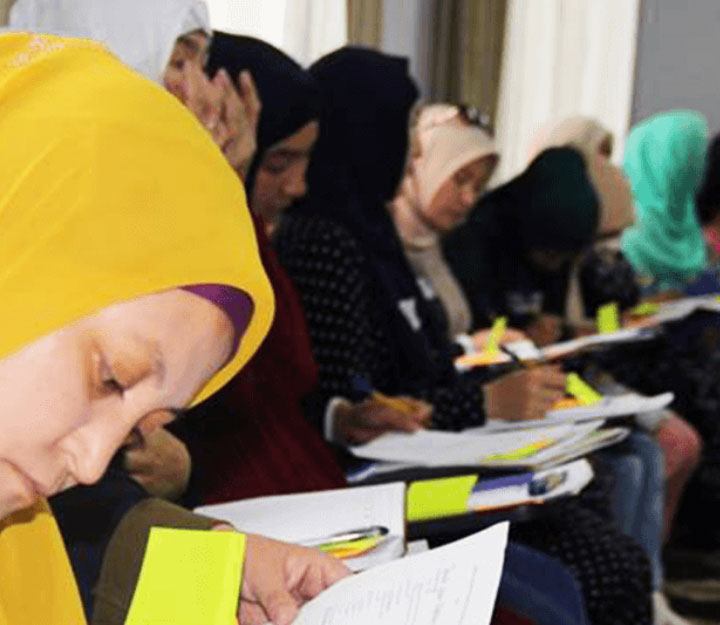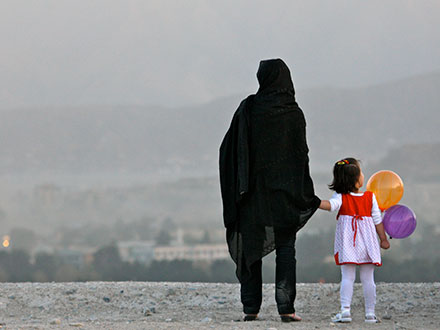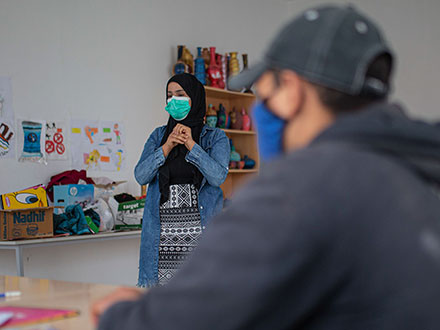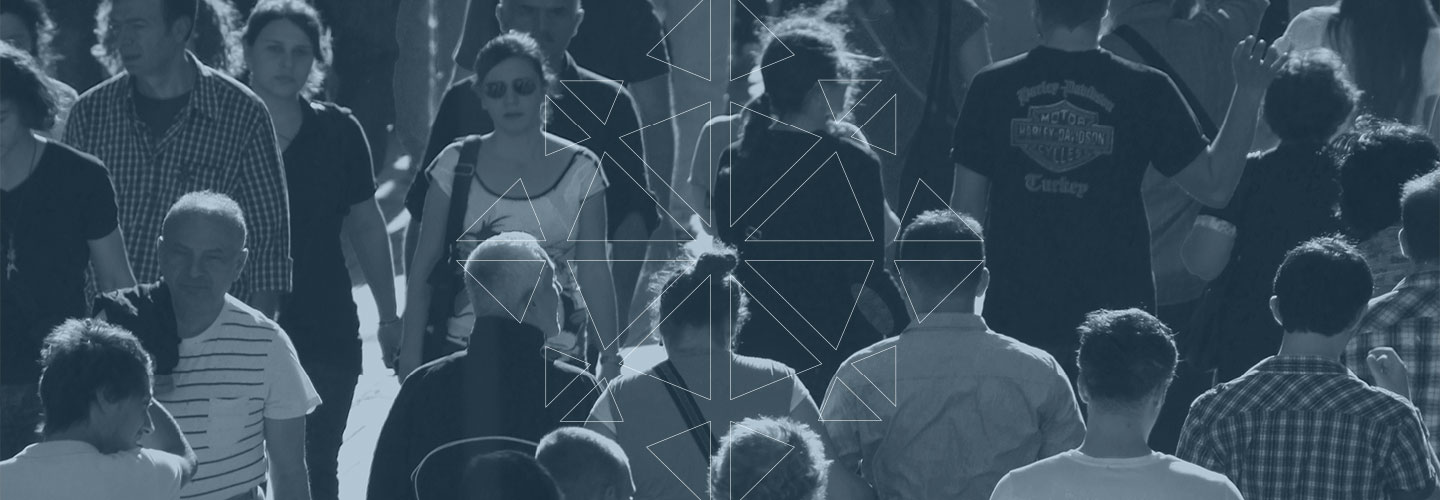
Consultant - Mid-Term Evaluation of EU STRIVE Global Program
Background
1.1. Context and justification
Hedayah was created in response to the growing desire from members of the Global Counter- Terrorism Forum (GCTF) and the wider international community for the establishment of an independent, multilateral center devoted to dialogue and communications, capacity building programs, research and analysis to counter extremism and violent extremism in all of its forms and manifestations. During the ministerial-level launch of the GCTF in New York in September 2011, the U.A.E. offered to serve as the host of the International Center of Excellence for Countering Extremism and Violent Extremism. In December 2012 Hedayah was inaugurated with its headquarters in Abu Dhabi, U.A.E.
As a leader within the counter extremism and violent extremism community, Hedayah works to enhance understanding and share good practices to effectively build the capacity of counter extremism and violent extremism actors across the globe to promote tolerance, stability and security. The organization has extensive experience in researching narratives and conducting strategic communication campaigns that influence knowledge and behavioural changes in target audiences. Through innovative projects such as Religious and Community Leaders Counter- messaging or Tackling Terrorist Use of the Internet through Media and Information Literacy and Social Media Platforms, Hedayah steps outside of traditional counter extremism and violent extremism programming. Additionally, with the rise of disinformation and propaganda from malign actors, Hedayah provides tailored programming through its digital projects.
Since 2015, the STRIVE Global Program, funded by the European Union through its Instruments Contributing to the Stability and Peace (IcSP) and Foreign Policy (FPI), and implemented by Hedayah, has provided assistance to governments and civil society organizations (CSOs) to implement activities as outlined in their respective countries National Countering Extremism and Violent Extremism Strategies and Action Plans. The STRIVE model developed by Hedayah acknowledged that locally led organizations taking a leading role in their communities provided streamlined and more impactful programming, because of their extensive knowledge of the local context, direct access to community-based actors, and broad networks that are sometimes absent from their international counterparts. Throughout the course of the six-year program (2015- 2021), STRIVE supported 38 local organizations and 10 government’s countering extremism and violent extremism units throughout the Western Balkans, Central Asia, MENA, and South Caucasus. Through 18 projects related to prevention of radicalization and extremism and violent extremism more than 15,000 youth/students, 1,850 school staff (teachers, psychologists and social workers), 2,000 family members, 52 religious leaders and 26 police officers have been targeted for support.
STRIVE Global Program PHASE II (2022-2026) responds to the ongoing threat of global extremism and violent extremism and the need for effective responses that ameliorate, rather than exacerbate, the threat. The Mission Statement is to reduce the risk of radicalization leading to extremism and violent extremism through resilience building of vulnerable communities and individuals to recruitment and radicalization techniques whilst continuing to respect human rights and international law. The Overall Objective of the Program is to build the capacity of local CSOs and government entities to design and implement impactful interventions in line with their respective Countering Extremism and Violent Extremism National Strategies and Action Plans to prevent radicalization leading to extremism and violent extremism, and recruitment to terrorism and facilitate the de-radicalization, rehabilitation and reintegration processes of foreign terrorist fighter returnees and their family members. Our methodology will rely on the allocation of financial and technical support to third parties, and with the provision of expert support to governments through targeted training and capacity building.
1.2. Institutional setup and key management issues
STRIVE Global Program PHASE II (2022-2026) assists local organizations in the design of countering extremism and violent extremism projects and the implementation, monitoring and evaluation through a sub-granting partnership mechanism (Call for Proposals)); Hedayah has contract-holder status with the EU and supports the implementation of the program with a Program Manager, a Program Officer, a Finance and Grants Officer and an Admin and Procurement Officer. Furthermore, two to three external consultants work remotely to support CSOs capacity building.
The geographic focus includes the Western Balkans (Albania and North Macedonia), Central Asia (Kyrgyzstan), South Caucasus (Georgia), MENA (Tunisia) and Nigeria.
STRIVE Global Program PHASE II started on the 14th of October 2022 and will conclude after 48 months. The evaluation will cover the period from the starting date to 13th October 2024.
(The program is open to be expanded to more countries in the mentioned regions as per governments engagement. The implementation period covered by this mid-term evaluation only includes Albania and North Macedonia, Kyrgyzstan, Georgia, Tunisia and Nigeria.)
Description of the Strive Global Program Phase II
2.1. Mission and Objectives of the Program
- Mission
The Mission Statement is to reduce the risk of radicalization leading to violent extremism through resilience building of vulnerable communities and individuals to recruitment and radicalization techniques whilst continuing to respect human rights and international law.
- Overall objective
To build the capacity of local CSOs and government entities to design and implement impactful interventions in line with their respective Countering Extremism and Violent Extremism National Strategies and Action Plans to prevent radicalization leading to extremism and violent extremism, and recruitment to terrorism and facilitate the de-radicalization, rehabilitation and reintegration processes of foreign terrorist fighter returnees and their family members.
- Specific objectives (SO):
SO1: To increase local understanding of the fundamentals of preventing/countering extremism and violent extremism, inclusive of recruitment, radicalization, perceptions of security issues and attitudes towards ethnic and religious minority groups, returnees, and push and pull factors.
SO2: To strengthen the capacity of civil society organizations and government entities to prevent and counter radicalization leading to extremism and violent extremism and terrorism, and increase collaborative engagement of both parties.
SO3: To increase community resilience to the threat of radicalization, extremism, violent extremism and recruitment to terrorism, and facilitate de-radicalization, rehabilitation and reintegration processes at country level through CSOs mechanism of funding.
2.2. Expected outcomes and outputs
Outcome (OC) 1. Increased local understanding of the fundamentals of preventing/countering extremism and violent extremism, inclusive of recruitment, radicalization, perceptions of security issues and attitudes towards ethnic, religious minority groups, returnees, push and pull factors.
This first outcome will be achieved by conducting social empirical research that provides an evidence base for countering extremism and violent extremism interventions. Research outputs will include country-specific assessments that will influence the design of projects under the Outcome 2. Programming will be focalized on specific target groups and will cover gaps in previous studies conducted at country level.
- Following, the Outputs under Outcome 1:Output 1.1.1. Desk research/assessment conducted in target countries and related reports;
Output 1.1.2. Call for Proposals Guidelines elaborated and published;
Output 1.1.3. Organizations that will conduct the research selected
Output 1.1.4. Research projects designed;
Output 1.1.5. Grant contracts signed;
Output 1.1.6. Data collection tools designed, and data collected;
Output 1.1.7. Data analysis conducted and research reports.
Outcome (OC) 2. Strengthened the capacity of civil society organizations and government entities to prevent and counter radicalization leading to extremism and violent extremism and terrorism, and increased collaborative engagement of both parties.
This second outcome will continue to build the capacity of CSOs through financial and technical support (there will be two rounds of Calls for Proposals addressed to CSOs for projects design and implementation) and encourage collaborative approaches with governments, but it will also build the capacity of government entities and CSOs directly through training and service support such as countering extremism and violent extremism specific training, design and production of strategic communication campaigns, and ongoing assistance as and when requested.
- Following the Outputs under Outcome 2:
Output 2.1.1. Government entities staff and CSOs training/support needs in target countries identified and related reports;
Output 2.1.2. Training content contextualized;
Output 2.1.3. Six trainings conducted;
Output 2.1.4. Supported countering extremism and violent extremism units at country level
Output 2.2.1. Scope missions in target countries conducted and related reports;
Output 2.2.2. Two Calls for Proposals Guidelines elaborated and published;
Output 2.2.3. Grantees selected;
Output 2.2.4. Countering Extremism and Violent Extremism projects designed;
Output 2.2.5. Grant contracts signed.
Outcome (OC) 3. Increased community resilience to the threat of radicalization, extremism, violent extremism and recruitment to terrorism and facilitated de-radicalization, rehabilitation and reintegration processes at country level through CSOs mechanism of funding.
The projects selected under outcome 2 will be followed up under this activity to ensure impact at community level.
- Following the Output related to Outcome 3:Output 3.1. Trainings/campaigns to prevent radicalization and violent extremism for projects target groups, and rest of projects activities designed as per needs, delivered in target countries.
Outcome (OC) 4. Provided practical steps for the use of the Abu Dhabi Memorandum on Good Practices for Education and Countering Violent Extremism2 through bringing together the international community, technical experts and CSO/NGOs.
As requested by the EU, Hedayah will support the Global Counter Terrorism Forum -GCTF- Initiative on Education for the Prevention and Countering Extremism and Violent Extremism Conducive to Terrorism, which seeks to update existing good practices with advancements in the prevention and countering extremism and violent extremism and Education space, and provide practical steps for the concrete use of the Abu Dhabi Memorandum and Action Plan.
- Following the Outputs related to Outcome 4:
Output 4.1.1. Initiative Launch Meeting;
Output 4.1.2. Thematic Expert Workshop, Research Brief, Toolkit, ToT Curriculum;
Output 4.1.3. Initiative Final Conference.
2.2. Main activities
Under OC1 the main activities to implement are on developing research/studies, and this will take place through financial support to third parties within the first 15 months of the program implementation, in order to have enough time to design and implement specific projects (Outcome 2 and Outcome 3) that respond to the problems/needs found.
- Five Research projects have been granted during activities under OC1, which are currently under implementation:✓ One research project in Albania, started on 01/03/2024 for a period of 6 months (amount granted 46, 716.20 EUR).✓ One research project in North Macedonia, started on 15/01/2024 for a period of 6 months (amount granted 50, 000.00 EUR).✓ One research project in Georgia, started on 01/04/24 for a period of 6 months (amount granted 50 000.00 EUR).✓ Two research projects in Kyrgyzstan, of which one started on 10/06/24 always for a period of 6 months (amount granted 50, 000.00 EUR), and the other one started on 01/03/24 for 6 months (amount granted 49, 886.61 EUR).
Under OC2 the main activities to implement are envisaged to directly respond to concrete training needs of government entities and CSOs staff as per their request, and Calls for Proposals will be launched to grant proposals to counter extremism and violent extremism at national and local level. We will rely on Hedayah’s existing training curricula, such as: “Introduction to countering extremism and violent extremism” (created in the frame of STRIVE Global Program-Phase I), “Rehabilitation and reintegration of youth and children”, “Mobilizing families and communities for rehabilitation and reintegration”, “Community oriented policing”, “Teachers preventing extremism and violent extremism through education”, “Extremism and violent extremism and terrorism reporting”, with adaptations to each country context and making it available in the respective languages. Six trainings will be delivered to around 150 people among government entities and CSOs staff. Additionally, two Calls for Proposals will be used to grant civil society organizations in selected countries to implement countering extremism and violent extremism projects.
- Four Countering Extremism and Violent Extremism projects have been granted during activities under OC2 and are under implementation:✓ A Countering Extremism and Violent Extremism project has been granted in Albania, started on 01/03/24 for a period of 18 months (amount granted 99, 164.66 EUR).✓ Another Countering Extremism and Violent Extremism project has been granted in North Macedonia, started on 15/04/24 for a period of 18 months (amount granted 99, 933.00 EUR).✓ And two Countering Extremism and Violent Extremism projects have been granted in Tunisia, one started on 01/06/24 for a period of 14 months (amount granted 99, 999.00 EUR), and the other one started on 10/06/24 for a period of 18 months (amount granded 99, 969.00 EUR).Furthermore, seven additional activities have been implemented under OC2 directly by Hedayah, as follows:✓ Two trainings in Tunisia on Rehabilitation and Integration of youth and children, and on Communications in Countering Extremism and Violent Extremism for government officials and CSOs representatives (May and June 2023).✓ Training in Kyrgyzstan on Monitoring & Evaluation of Kyrgyz Republic’s National Action Plan to Counter Extremism and Terrorism for participants from implementing agencies, ministry and other relevant bodies in country (February 2024).
✓ Two trainings in Nigeria on Supporting Families in Countering Extremism and Violent Extremism for local actors (May 2024).
✓ Training and communications campaign in Tunisia to enhance the capacity of Tunisian Counter-Terrorism Commission in campaign messaging and then raise public awareness against violent extremist ideologies and propaganda through an ad hoc campaign to be launched across various media platforms (June 2024).
✓ Training in Albania on Introductory guide to concepts, programming and best practices to Countering Extremism and Violent Extremism for the CVE Coordination Center staff (July 2024).
Under OC3 the main activities will focus on monitoring and following-up the granted countering extremism and violent extremism projects and to ensure impact at community level.
Under OC4 the main activities will focus on producing a Research Brief based on qualitative research and desk review to understand new and emerging lessons, needs and challenges in the education and Preventing and Countering Extremism and Violent Extremism space; a Toolkit for the practical use of the Abu Dhabi Memorandum and Action Plan focused on providing a monitoring and evaluation framework as well as featuring lessons learned and case studies, a Training of Trainers Curriculum for policymakers and/or educators to aid with operationalization of the Memorandum should they choose, and bringing the actors together in workshops and conferences to discuss the findings and potential update of the Memorandum. The GCTF Initiative on Education for the Prevention and Countering Extremism and Violent Extremism Conducive to Terrorism is ongoing (started in November 2023) and is planned to last until end of October 2025.
Objectives of the Mid-Term Evalutation
3.1. Overall objectives
Objectives of the Mid-term evaluation are:
- To provide Hedayah, its partners on the ground, EU and other interested stakeholders with sufficient and accurate information to make an informed judgment about the progress of the program.
- To document lessons learnt and good practices.
3.2. Specific objectives
Specific objectives of the Mid-term evaluation are:
- To make an overall independent assessment of the program progress (i.e. the level of fulfilling the objectives as stated in the program document) and to evaluate the achievements and weaknesses of the program in respect to the six OECD-DAC evaluation criteria3 (what is applicable at this stage of the program implementation) as relevance, efficiency, effectiveness, impact, coherence and sustainability against original program objectives taking account of the realities on the ground.
- To evaluate the program implementation strategies and process/structures, including assessment of its alignment with EU and country policies, institutional and operational set- up with the view to make recommendations on whether they are the best to achieve the program objectives.
- To identify key lessons and to propose practical recommendations for follow-up actions.
(The experts shall consider applying EU Methodological guidance for evaluation and the main evaluation criteria across all program components. The guide can be found at the following link: https://capacity4dev.europa.eu/groups/evaluation_guidelines/info/en-methodological-bases-and-approach_en)
Scope of the Work
The evaluation will take place either in countries selected for the evaluation and/or remotely. Hedayah will facilitate the whole evaluation process, and the evaluators will be provided with grantees’ and other stakeholders’ contact details to set interviews.
The evaluation study will follow the structure outlined in the table below and in the EU Methodological guidance for evaluation, and shall include, at minimum, the following aspects: relevance, effectiveness, efficiency, coherence, impact, sustainability, partnership and conclusions (comprised of recommendations and lessons learned).
Below the table that summarizes the relevant points to address and the questions to be answered:
- Relevance of the intervention/pro gram design (problems and needs)Relevance refers to the appropriateness of the actions and capacity building of the beneficiaries.Analysis should focus on:- The extent to which the program is consistent with, and supportive of the policy and program framework of Governments, Civil Society Organizations and EU Policies.- The quality identifying key stakeholders and target groups and institutional capacity issues (i.e. selection of target beneficiaries and how are the needs of the most vulnerable groups /identified groups covered/beneficiary coverage).
– The stakeholder involvement in the design process and implementation of the program, the level of local ownership and implementation capacity.
- Effectiveness (achievement of purpose)This is the analysis of whether the set objectives are being achieved as intended by Hedayah, the EU, and other stakeholders (i.e., local government institutions), and how assumptions are affecting project achievements, including:- Whether the planned benefits are being delivered and received by target groups, both in STRIVE logframe and in grantees logframes, as perceived by all key stakeholders,- Whether intended beneficiaries are participating in the intervention.
– Whether longer implementation periods for granted projects (in respect to STRIVE Global Program Phase I) has been beneficial and more effective.
– Are there unanticipated results (positive/negative) yielded by the program, and what are the consequences for achieving the purpose?
Note that you can build on the prior STRIVE Global Program Phase I evaluation, that Hedayah will share.
- Efficiency (sound management and value for money)The efficiency criterion concerns how well the various activities transform the available resources into the intended results or outputs, in terms of quantity, quality and timeliness; a comparison should be made against what was planned:Analysis should focus on:- Operational work-planning, implementation, and budget management. -Relations and coordination with local authorities, institutions, beneficiaries.
– The quality of information management and reporting, and the extent to which key stakeholders have been kept adequately informed about the program activities.
– Respect for deadlines.
– The extent to which the program’s costs are being justified by the benefits (expressed in monetary and other terms) compared with similar programs or known alternative approaches.
– Technical assistance, how well is helping to provide appropriate solutions and developing local capacities to define and produce results?
– Quality of monitoring, its existence, accuracy and flexibility and the use made of it. The monitoring activities Hedayah staff performed under STRIVE Global Program phase II (to control the quality of the activities implemented by grantees and during activities directly implemented by Hedayah, or the quality of documents produced), and the quality of monitoring activities planned and performed by the grantees in their respective projects (adequacy of baseline information).
– If any unplanned outputs have arisen from the activities so far.
- Coherence (compatibility of the intervention with other interventions in a country, sector or institution)The compatibility of the intervention with other interventions in a country, sector or institution. Analysis should focus on the program coherence with current and ongoing initiatives (i.e. other EU and donor programs and other Hedayah’s projects/activities, particularly in the target countries).In particular, the analysis should focus on:- How well does the intervention fit in the country sector?
– How well does the intervention fit with the other similar interventions in country?
– How well does the intervention fit with the Strategy and National Action Plan to counter extremism and violent extremism in country?
- Impact (achievements of wider effects)Impact reflects the extent to which the benefits received by the intended beneficiaries brought any change in their performance, including:- What impact is the implementation of the program bringing?
– The level of implementation regarding the baseline and end of phase target.
– Analysis of the main achievements and results of the program, the impact/outcome of the different program components, the program impact, both anticipated and unanticipated.
– How useful and relevant are the program activities perceived by the beneficiaries and stakeholders within the localities?
– Is the program contributing to the prevention of radicalization and extremism and violent extremism and is being socially spread, e.g., improvement in the cases referral mechanism systems at municipality level, and increase of employment opportunities among projects target youth, impacts on the level of tolerance, social cohesion, etc. (as per projects subjects)?
– Assess the extent of application of cross-cutting issues such as gender and organizational development/capacity building.
– Are there data available to measure this impact?
- Sustainability (likely continuation of the achieved results)This criterion refers to the ability and capacity of beneficiaries to implement the outcome of an activity once the core support is stopped and verifies whether the design and orientation of program activities are based on the principle of building sustained capacities in beneficiaries:Analysis should focus on:- Local ownership of the objectives and achievements e.g., how far stakeholders are being involved in the design and implementation of activities, whether their feedback is being sought and whether they remain in agreement with the program objectives, the partnership agreement, and the financial commitment of Hedayah.
– Policy support and the responsibility of Hedayah e.g., how far donor policy and national priorities are aligned, the potential effect on any policy changes. How far the relevant national, sectorial and budgetary policies and priorities are affecting the program positively or adversely, and the level of support from (local) governments, public, business and/or private sector.
– Institutional capacity (financial and administrative) of Hedayah’s partners as well as local governments in terms of policy and budgetary support. Whether the counterparts are properly being prepared to take over, technically, financially and managerially.
– The adequacy of the program/projects budget for its purpose.
– The extent of application of cross-cutting issues such as gender and organizational development/capacity building.
– How is knowledge retained after trainings/workshops or similar? What happens to the knowledge attained and the capacity built of local partners and governments at different levels?
- PartnershipIn addition to the above, the evaluation will consider the following issue concerning partnership:- Assess the coordination, networking, and collaboration at all levels in carrying out the Program –which means both internally within Hedayah and with external partners, i.e., relationship/ cooperation between Hedayah and the EU; Hedayah and other donors and International Organizations working on Countering Extremism and Violent Extremism / Hedayah and other institutions and NGOs working on Countering Extremism and Violent Extremism.
- Conclusions, recommendations and lessons learned
Concerning conclusion part, the report in particular will:
– Outline successes and results and causes, cost-efficiency, adequacy of means and time to achieve the purpose, and sustainability.
– Include Lessons learned, which should cover policy, organizational and operational lessons, pre-conditions that should have been required as well as general lessons.
– Reflect the conclusions, taking into consideration that it should be a summary of the results reached by the program at this stage, and the focus should be on outlining achievements, constraints, and suggested remedies.
– Outline the recommendations, which should develop considerations regarding possible future support to Countering Extremism and Violent Extremism work under the European Union Counter Terrorism agenda4 and the UN Plan of Action to Prevent Violent Extremism5. Therefore, a specific section shall be dedicated to this topic.
Note 2: Raw data and interviews transcripts will need to be kept in records for Hedayah.
Principles underpinning the approach to evaluation are:
- Impartiality and independence of the evaluation process from the programming and implementation functions;
- Credibility of the evaluation, through use of appropriately skilled and independent experts and the transparency of the evaluation process, including wide dissemination of results;
- Participation of stakeholders in the evaluation process, to ensure different perspectives and views are taken into account;
- Usefulness of the evaluation findings and recommendations, through a timely presentation of relevant, clear, and concise information to decision-makers.
Outputs of the Evaluation
The evaluation consultant/team (company or independent consultants with a team leader) shall produce the following documents and presentations:
A proposed detailed methodology, preferably proposing mixed methods of quantitative and qualitative data collection and analysis (Hedayah will facilitate all necessary documents to prepare the methodology, and evaluators must read all the documents related to the program and projects facilitated) including a representative sample of projects to be evaluated and a representative sample of target countries to be visited that should include countries in at least three different regions (Europe, Africa and Central Asia), and a work plan/schedule. This will be submitted within a maximum of ten days after an initial online briefing with Hedayah.
- A brief summary of the findings will be presented online to Hedayah at the final debriefing once the evaluation concludes.
- A draft Final Report. The main sections of the evaluation report should be as follows:
I- Executive Summary
It should be tightly drafted and usable as a free-standing document. It should be short, not more than four pages. It should focus on the main analytical points, indicate the main conclusions, lessons learned, and specific recommendations. Cross-references should be made to the corresponding page or paragraph numbers in the main text that follows.
II-Body, introduction and findings
The body of the report should start with an introduction describing, first, the project or program to be evaluated and, second, the evaluation objectives. Then, a summary of the methodology applied for this evaluation, with the map of the program/projects areas. Furthermore, the majority of the report should follow the seven evaluation criteria, describing the facts and interpreting or analyzing them following the key questions pertinent to each criterion.
III- Conclusions and Recommendations
These should be presented as a separate final chapter. Wherever possible, for each key conclusion there should be a corresponding recommendation. The conclusions must be accurate, avoiding contradictions and/or inconsistencies, and should be well evidenced providing reference to key and precise information and sources, to understand how the evaluators came to those conclusions. The key points of the conclusions will vary in nature but will often cover aspects of the evaluation criteria. Moreover, relevant comments from stakeholders to illustrate the conclusions should be included.
The ultimate value of an evaluation depends on the quality and credibility of the recommendations offered. Recommendations should therefore be as realistic, operational, and pragmatic as possible. Recommendations should be carefully targeted to the appropriate audiences at all levels and include insights for follow-up actions. Lessons learned/best practices that Hedayah and program’s stakeholders can learn from for future projects should also be included.
IV- Annexes
– Terms of Reference of the mid-term evaluation.
– Names of the evaluator/s (and their companies if applies), and evaluators profile and role during the evaluation, clarifying who is the team leader.
– Methodology document prepared for the study (phases, methods of data collection, sampling, data analysis, etc.).
– Program and projects Logical Frameworks analyzed.
– Map of the program/projects area, if relevant.
– List of persons/organizations/government entities consulted at country level naming the position and role played in the program/projects.
– Bibliography of literature and documentation consulted.
– Other technical annexes (e.g., statistical analyses tables, budgets, etc.).
- A Final Report version, upon revision of the draft final report by Hedayah, and with all issues addressed if any.
The Final Report will comprise a maximum of 30 pages excluding annexes. The reporting language will be English.
The submission of reports shall be presented with the following timing:
– Summary debriefing presentation at the end of the evaluation shall be given online to Hedayah for discussion.
– Draft Final Report according to the comments made at the debriefing must be presented to Hedayah within 2 weeks after the evaluation.
– The revised Final Report based on Hedayah’s comments on the draft final report will be submitted within 1 week once Hedayah’s provides comments.
In all reporting, the expert’s assessment shall be objective and balanced, affirmations accurate and verifiable providing the evidence and source, and the proposed recommendations realistic.
Location and Time Frame
The location of the assignment is remote and in those countries where countering extremism and violent extremism projects are currently being implemented. It is expected the evaluators to travel to those countries for short term missions. Evaluators should also assess the research projects ongoing in Albania, North Macedonia, Kyrgyzstan and Georgia, and other activities implemented in Nigeria, this could be done online.
The evaluation is expected to start by 4 November 2024 (tentative) with days of home-based desk study, online meetings and compilation of data with Hedayah, grantees, beneficiaries, and other stakeholders, and visits and interviews on the ground in the target countries.
The Final Evaluation Report is expected to be presented no later than 28 February 2025.
The total number of days for the assignment is a maximum of 60 working days. The tentative
timetable of the evaluation is as follows:
Phase I:
Expected duration: max 10 working days
Desk Study/planning:
– Preparation of methodology and work plan after an initial online briefing with Hedayah.
-Preparation of visits schedule to target countries, and arrangement of online interviews/meetings with local partners/grantees, stakeholders, projects beneficiaries, etc., upon final approval of methodology and work plan by Hedayah.
Phase II:
Expected duration: max 30 working days
– Field work/data collection (this phase includes trips to target countries including, if necessary and agreed, an initial visit to Hedayah in Abu Dhabi to interview Hedayah staff)
– Interviews/meetings with local partners/grantees, stakeholders, projects beneficiaries, etc.
Phase III:
Expected duration: max 20-workings days
-Data analysis and reporting
-Presentation of Draft Report after missions
-Comments to Draft Report from Hedayah
-Presentation of Final Report and debriefing with Hedayah and EU.
Team Composition/Expert Profile
The evaluation team will:
- Carry out the evaluation as per ToR and be responsible for the findings, conclusions and recommendations of the evaluation.
- Report to Hedayah, be in regular contact, coordinate schedule/field studies timing with Hedayah and seek their advice, when needed.
The expert(s) is(are) required to have the following expertise:
- Substantial working experience in Prevention/Countering Extremism and Violent Extremism (minimum 3 years).
- Sound knowledge of and proven experience of impact analysis and international project procedures, including Project Cycle Management (PCM), Logical Framework Approaches (LFA), and Theory of Change.
- Proven knowledge and experience of EU-supported projects or programs in countries of Central Asia, MENA, and Western Balkans region contexts, focusing on programs on preventing/countering extremism and violent extremism initiatives.
- The consultant/s or the team leader of consultants’ pool must have undertaken at least two similar evaluation assignments.
The expert(s) must also have:
- University degree in a discipline relevant to the scope of the assignment as well as field experience relevant to the Terms of Reference.
- At least 10 years of general experience in the area relevant to the assignment in any of the target countries.
- Well-versed in research and project evaluation methods and techniques, including application of EU Methodological guidance for evaluation.
- Proven knowledge of technical and financial program management in an international partnership/civil society context, including knowledge of assessing institutional management structures and systems in project/program implementation.
- Proven experience with project implementation and management of EU-FPI supported projects/programs.
- Strong team working abilities.
- Proven ability to rapidly produce quality reports and to work under tight deadlines.
- Excellent English language, facilitation and communication skills.
Conflict of Interest
Contractor or expert(s) who has been involved directly or indirectly (former program staff, feasibility study, local mission, etc.) in the program’s delivery activities cannot be considered for this assignment.
The firm/consultant(s) will have to sign a Non-Disclosure-Agreement as part of the service contract with Hedayah to preserve the confidentiality of the work.
The selected consultant(s) must be self-sufficient in traveling to target countries: flight tickets, visa, COVID 19-PCR or any vaccination needed, ground transportation, accommodation, meals, laptop and internet connection, online meetings platforms and/or phone costs, health insurance. The selected consultants must be self-sufficient in terms of travel to Abu Dhabi, accommodation, meals, laptop and mobile phone. Hedayah will facilitate space where to work and to have phone calls with the different partners and stakeholders. Hedayah will also facilitate contact with grantees and other stakeholders and support with any meeting/interview if required.
Role of Hedayah Management
- Hedayah/ STRIVE Global Program PHASE II Program Manager, Program Officer and the Grant and Administration Officer will manage the evaluation regarding funding and contracting and the implementation arrangement, and will follow the evaluation throughout the process until the final report is completed.The role of Hedayah/STRIVE Global Program Manager, Program Officer and the Grant and Administration Officer in the evaluation will include:
- Liaise on a regular basis with the consultant or the team leader of the evaluation team.
- Comment on and approve the final versions of the proposed methodology, sampling, work plan, and evaluation reports.
- Coordinate internal Hedayah contributions (from other Hedayah staff and Management), including assisting in contacting Governments, donors, local partners and other stakeholders when required.
- Provide feedback to the consultant or the evaluation team.
- Assist in organizing, facilitating the evaluation meetings, calls/field studies, missions, as per appropriate (this does not include any trip arrangement -flight tickets and accommodation).
- Organize the presentation of the evaluation results and assist with the necessary follow-up of the evaluation report.
Submission of Proposals and Selection Criteria
10.1. Submission of proposal/candidature
Firms/consultant(s) interested in applying to this tender should send the following documents and information to the email strive.admin@hedayah.ae with the subject STRIVE Global Program PHASE II _ midterm evaluation_ followed by the name of the firm/consultant. Deadline: 24 September 2024, 5:00 pm Abu Dhabi time:
- Cover letter (dated and signed) indicating the name of the program and a list of the documents attached.
- A technical proposal for the evaluation (following Annex III: Organization and Methodology template) including all the requirements mentioned in these ToR, representative sample of countries/regions to be evaluated and/or visited, work plan with tentative starting date, a list with the members of the evaluation team, and brief description of each member’s core competencies.
- Firm profile (if applicable), Curriculum Vitae of the evaluation leader and Curriculum Vitae of other team experts that will be involved in the evaluation (following Annex IV: Key experts’ template).
- Tax identification number of the firm/independent consultant(s) and the identity document of the firm legal representative/s and/or consultant/s.
- A financial proposal/budget forecast (following Annex V: Budget template, with detailed budget lines breakdown: including the unit, number of units, price per unit and total price, e.g., number of working days per team member and daily fee, number of flight tickets, number of accommodation days, meals, etc.), evaluation online and visits to at least three target countries located in at least three different regions, and visit to Abu Dhabi.The budget should not exceed 40,000 EURO.
10.2. Selection Criteria
Proposals/candidatures will be evaluated at first following the below criteria:
- Rationale – maximum20pts
- Strategy – maximum40pts
- Back up function (the assessment of the team members proposed is part of the back-up function) – maximum 30 pts
- Timetable – maximum10ptsOverall total score = 100 pts
Only technical proposals with average scores of at least 75 points qualify for the financial and final evaluation, before the candidate/firm is chosen. The financial and final evaluation will be based on best value for money, giving a score from 1 to 5 where 1 is poor value for money and 5 very good value for money.



